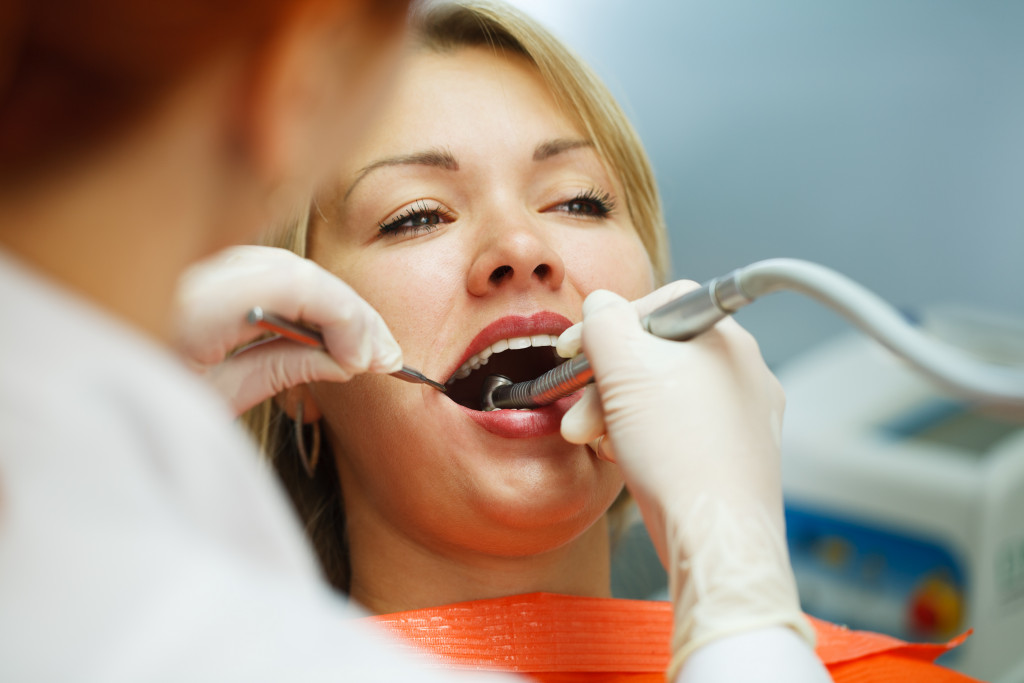- Visiting the dentist regularly—at least every six months—is essential for maintaining good oral health.
- Using an antiseptic or fluoride mouthwash after brushing your teeth can help protect your smile.
- Eating foods low in sugar and nutrients is key to having healthy teeth and gums.
- Poor dental hygiene can lead to gum disease and cavities, which can cause other serious illnesses.
- Good dental hygiene habits include brushing twice daily with fluoride toothpaste and flossing every day.
As you may know, taking care of your teeth is vital for overall health, but many people don’t realize just how essential it is to maintain good dental hygiene. Good dental hygiene keeps your teeth looking great and helps prevent serious oral health issues such as gingivitis and cavities. This blog post will discuss the best things you can do to improve your dental health.
The Importance of Good Dental Health
Good oral hygiene carries numerous benefits for both adults and children alike. Brushing twice a day and flossing once daily helps remove bacteria from the mouth that can lead to tooth decay, gum disease, and bad breath. It also helps keep teeth in top condition by removing plaque build-up and preventing cavities from forming in the first place. Regular visits to the dentist are also essential for maintaining healthy teeth and gums—and catching any problems early before they become serious.
Beyond helping you maintain healthy teeth, there are other advantages to having a clean mouth that many people don’t realize. For instance, studies have shown that good dental hygiene can reduce inflammation, which helps reduce stress levels and improve overall physical health.
Additionally, poor oral health has been linked to serious medical conditions such as diabetes, heart disease, stroke, dementia, and even some forms of cancer! Taking care of our teeth is no small matter—it’s integral to maintaining our well-being.
Good Oral Hygiene

So how can you ensure that we’re taking proper care of your mouth? Here are some easy tips to help keep your teeth healthy:
Visiting Your Dentist Regularly
Visiting your dentist regularly—at least every six months—is key for maintaining good oral health. During these visits, your dentist can detect signs of decay, gum disease, or any other problems before they become severe. If you have missing teeth, your dentist can recommend the best tooth replacement options according to your budget, lifestyle, and health needs.
Using Mouthwash
Did you know that mouthwash can help reduce plaque and bacteria that cause cavities and gum disease? Using an antiseptic or fluoride mouthwash after brushing your teeth can help protect your smile from further decay. Dentists recommend using mouthwash at least twice a day for best results.
Eating Healthy Foods
What you eat plays a massive role in your dental health. Eating foods low in sugar and nutrients will help keep your teeth healthy and strong. Fresh vegetables, fruits, and dairy products are all excellent choices for healthy smiles.
Floss Every Day
Flossing once a day is just as important as brushing twice a day. Flossing removes food particles and plaque that have built up between the teeth where your toothbrush can’t reach—and it’s essential to any good oral hygiene routine! Be sure to floss gently so as not to damage your gums or cause bleeding.
The Effects of Poor Dental Health

Poor dental health can have long-term detrimental impacts on one’s overall well being. Unaddressed dental issues can become chronic and may lead to much bigger health problems later in life. Poor oral hygiene can allow bacteria to build up, leading to gum disease, which has been linked to an increased risk of heart disease, strokes, and other cardiovascular illnesses.
Gum disease affects millions of people worldwide, yet many don’t recognize it until it has progressed too far for an easy fix. Left untreated, periodontal disease can permanently damage the gums and surrounding tissue, resulting in soreness and bleeding around teeth, swollen gums, and even loss of teeth over time.
Cavities are another common dental issue caused by inadequate oral hygiene habits. Although there are some cases where cavities cannot be prevented due to genetics or other factors out of our control, most cavities are a result of not taking proper care of our teeth daily.
Keeping up with good dental hygiene habits is incredibly important for both short-term and long-term oral health. Make sure you brush twice a day with fluoride toothpaste, floss every day, and visit the dentist regularly so they can monitor any changes in your mouth over time. With these tips in mind, you should be on track for improved dental health in no time!






